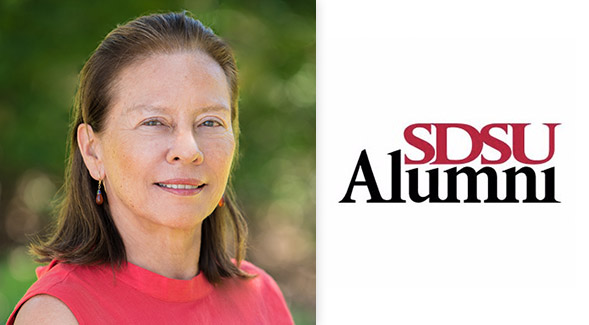A Point of Pride
SDSU alumna Piedad Garcia says her time at the university helped prepare her to lead during the pandemic.

“It is something within me I can only say is a calling that gives me the strength to continue helping our clients and our communities here in San Diego.”
Piedad Garcia (’81) is accustomed to crises. At 19, her first volunteer job was at a suicide crisis intervention line.
Early in her professional career she was initially exposed to large-scale crisis work as a mental health clinician in San Ysidro, where in 1984 a gunman opened fire in a fast-food restaurant killing 21 people and wounding 19 others. Garcia helped counsel and comfort the community.
In subsequent years on behalf of San Diego County Health and Human Services Agency (HHSA), she has responded to major California disasters including the 1989 San Francisco and 1994 Northridge earthquakes, the 1992 Los Angeles riots, school shootings and multiple local fires.
Now deputy director of the County of San Diego's Adult and Older Adult System of Care, Garcia has filled many roles in public health across 35 years and has faced her share of catastrophes. But none quite like the current COVID-19 pandemic.
“It’s not comparable,” she said. “I have never seen anything like this before. The closest we came to it was a few years ago with hepatitis A and the homeless population, but the scale of what we are doing right now is unprecedented.”
Leading with a macro lens
The County of San Diego’s Adult and Older Adult System provides services for residents who are experiencing a mental health crisis or who have, as a primary diagnosis, persistent, severe mental illness or an addiction. Last fiscal year alone, its outpatients in the system of mental health numbered close to 43,000 in addition to another 17,000 with substance use conditions.
Garcia and her administrative staff and housing specialists coordinate, administer and monitor approximately 174 contracts with an approximate budget of $300 million. With the arrival of COVID-19, everything about the way their team coordinates and delivers its services had to be reexamined to be responsive to their enrolled clients and the community at large.
Everyone from psychiatrists and clinicians to case managers and peer support specialists — the entire system — had to adapt, when necessary, to the use of personal protective equipment (PPE) and implement ever-changing guidelines from the Centers for Disease Control and Prevention (CDC). Both clinicians and clients had to be reeducated and trained for the transition from in-person to telehealth care, when clinically appropriate. Behavioral Health Services – through funding from the Coronavirus Aid, Relief, and Economic Security (CARES) Act — is in process to facilitate and enhance the access to equipment for telehealth care.
It is a point of pride for Garcia that through it all the system has continued delivering its services. “We have never closed,” she said. “Never.”
Garcia credits her SDSU Master of Social Work degree with helping to prepare her for a leadership role in the HHSA response to the pandemic.
“How to lead within a macro lens, I think, has been one of the major attributes from the School of Social Work,” she said. “It prepares students to not only deal with individuals in one-to-one sessions, group therapy or case management roles, but also to be involved in the community, to know what the community’s issues, barriers and challenges are and then how to impact those in the work you do.”
Post-pandemic, Garcia foresees a continuing evolution of telehealth and teleworking. She is optimistic about a coronavirus vaccine, but unsure of when it might be available.
As the pandemic continues, Garcia will rely upon her considerable fortitude and the self-care she has always practiced to see her through any crisis that arises, along with a canon she has called upon since her earliest days as a suicide intervention volunteer.
“The work I did then and continue now is not something I do for a paycheck,” she said. “It is something within me I can only say is a calling that gives me the strength to continue helping our clients and our communities here in San Diego.”



